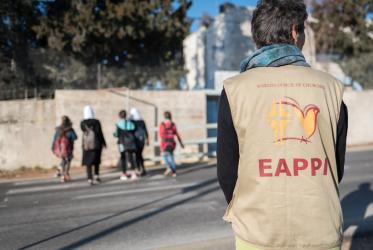Displaying 1 - 20 of 50
WCC honoured with Geneva Engage Award
01 February 2022
Dr Abuom reflects on women of faith as healers of creation
05 October 2021
Rethinking Ecological Relationships in the Anthropocene era
11 - 13 February 2021
Dr Saïd Ailabouni: God is on the side of rejected, oppressed, occupied
12 September 2019
Shabbat dinner ‘helps humanize two sides of the story’
27 March 2019
Fr Alexi - a peacemaker in Syria
21 December 2018
A moment in ‘Time’: an interreligious vision in Erlangen
20 December 2018
Romani people seek “lives of decency, dignity, and justice”
27 September 2018












